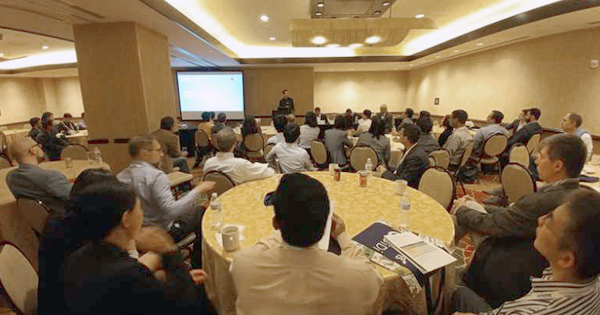


Studying Big Data in Business
December 07, 2017
Combining computational algorithms with human decision-making
Faculty members from the University of Delaware’s Alfred Lerner College of Business and Economics led efforts to host a new academic conference on business data science.
Xiao Fang, UD associate professor of of Management Information Systems, served as co-chair of October’s Institute for Operations Research and the Management Sciences (INFORMS) Workshop on Data Science in Houston, Texas, and worked with other Lerner College faculty to initialize and organize the groundbreaking conference.
Fang said workshops like this are important because business data science is a unique type of data science with its own challenges and opportunities.
“Business data science is not just about computational algorithms, because all business work involves human decision-making,” Fang said. Business data science, unlike many other forms, he said, is “the combination of computational algorithms with theories and methods on human decision-making.”
INFORMS says on its website that it is the leading international association for professionals in operations research and analytics, with more than 12,500 members worldwide.
Fang and UD faculty also worked with faculty members from Rutgers University, the University of Texas at Dallas, Temple University, the University of Utah, the University of Virginia, the College of Artificial Intelligence and the Harbin Institute of Technology in China to create the workshop in Houston. The regular INFORMS conference was held in Houston, so organizers decided to host the data science workshop in the same place to make it easy for people to attend.
The conference had 150 attendees from academia, industry and government, including McKinsey & Company, IBM, Procter & Gamble, the U.S. Air Force, Dell Technologies and Zillow.
Fang said the event covered topics including data science methodology, customer intelligence, healthcare analytics and social network data science. The conference is one of the many ways in which the Lerner College will “play an important part” in the future of data science at UD, Fang said. As “big data” analytics becomes an increasingly important part of American society and business, UD has made data science a priority, hosting a symposium on the future of data science at the University this year.
Director of the Lerner College’s Institute of Financial Services Analytics (IFSA) Bintong Chen added, “As more faculty members at Lerner and UD carry out interdisciplinary research, data seems to be a natural bonding that ties various research areas together. Data science is universal and common to all applications, ranging from business and engineering to social, biological and physical sciences. A University-wide focus on data science research will enhance collaborations among different colleges at UD and various departments within Lerner.”
Along with Fang, the INFORMS Workshop also featured other faculty and students from the Lerner College and IFSA.
For example, IFSA doctoral candidate Xin Ji, assistant professor of business administration Yi-Lin Tsai and associate professor of operations management Adam Fleischhacker presented a paper entitled, “A Uniqueness-Driven Clustering Algorithm and Its Application to Automated Identification of Local Competition” at the conference.
This paper explores the use of certain types of algorithms to automate businesses’ competitor identification processes in local markets.
Fang also presented a paper he co-wrote, “First, Do No Harm: Predictive Analytics for Risks of In-Hospital Adverse Events.” This paper demonstrates the use of new in-hospital prediction methods that could help improve patient safety.
Lerner College Dean Bruce Weber participated in the workshop’s Dean’s Panel on Data Science with deans from around the country and globe.
“The deans’ panel discussion emphasized that data science is an emerging, cross-disciplinary topic with the ambitious goal of contributing to organizational performance across all functions including operations, finance, HR and marketing,” Weber said. “Business schools are eagerly developing data science curricula and launching research collaborations, but it is not one-size-fits-all. The emphasis at Lerner is on financial services applications.
“The workshop showed the range of methods that are being deployed successfully to use data and models to drive better decisions and higher performance. It's exciting to see researchers at work on grand challenges.”
Fang said that while many forms of data science measure success solely through the performance of computational algorithms, business data science must go beyond traditional metrics like speed or scalability.
“For business data science, we will go well beyond that,” he said. “We need to consider what value your computational algorithm can bring to the organization. What’s the utility of your computational algorithm? What social welfare can this computational algorithm create for organizations, for society? So that’s well beyond accuracy, speed or these kind of common metrics used in data science.”
Fang said that he was proud to see UD faculty members and students playing such a key role in the workshop, showcasing the fact that “At Lerner and IFSA we are doing excellent data science research.”
Contact Us
Have a UDaily story idea?
Contact us at ocm@udel.edu
Members of the press
Contact us at 302-831-NEWS or visit the Media Relations website

